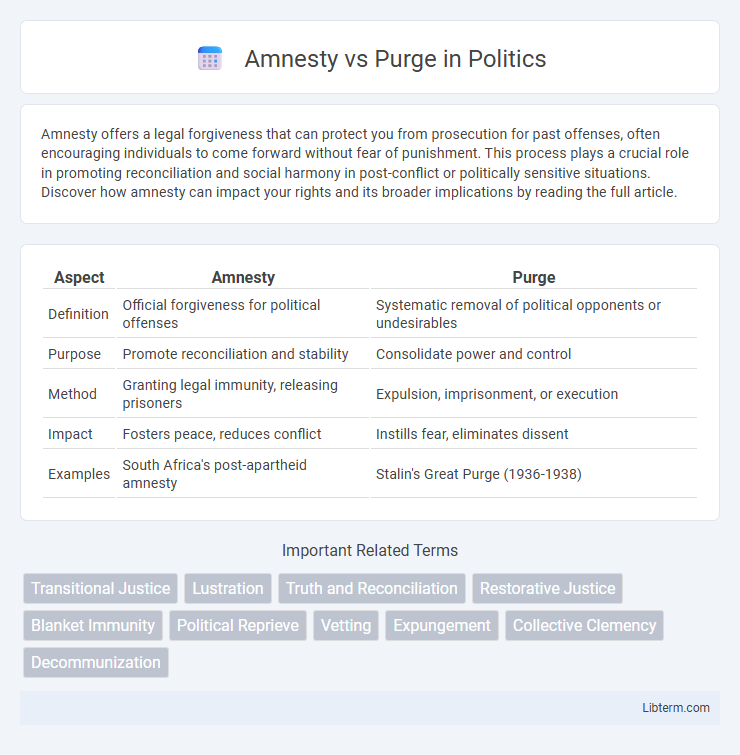Amnesty offers a legal forgiveness that can protect you from prosecution for past offenses, often encouraging individuals to come forward without fear of punishment. This process plays a crucial role in promoting reconciliation and social harmony in post-conflict or politically sensitive situations. Discover how amnesty can impact your rights and its broader implications by reading the full article.
Table of Comparison
| Aspect | Amnesty | Purge |
|---|---|---|
| Definition | Official forgiveness for political offenses | Systematic removal of political opponents or undesirables |
| Purpose | Promote reconciliation and stability | Consolidate power and control |
| Method | Granting legal immunity, releasing prisoners | Expulsion, imprisonment, or execution |
| Impact | Fosters peace, reduces conflict | Instills fear, eliminates dissent |
| Examples | South Africa's post-apartheid amnesty | Stalin's Great Purge (1936-1938) |
Introduction: Understanding Amnesty and Purge
Amnesty refers to the official pardon granted to individuals or groups for past offenses, often aimed at promoting reconciliation and social healing. Purge involves the forceful removal or elimination of individuals deemed undesirable, typically from political, social, or organizational positions, to consolidate power or enforce ideological conformity. Understanding the distinctions between amnesty and purge is crucial for analyzing their impacts on justice, governance, and societal stability.
Defining Amnesty: Concept and Contexts
Amnesty refers to a governmental act that grants a full pardon to individuals or groups, typically for political offenses or crimes committed during conflict or dissent, effectively erasing legal consequences and restoring civil rights. This concept is often implemented in post-conflict or transitional justice contexts to facilitate reconciliation, social stability, and the reintegration of offenders into society. Amnesty differs from a purge, which involves the removal or punishment of undesirable elements within a political or organizational structure, emphasizing forgiveness and legal closure over punitive action.
Purge Explained: Origins and Applications
Purge refers to the systematic removal of individuals considered undesirable or threatening by a government or organization, often involving imprisonment, exile, or execution. Originating from political regimes seeking to consolidate power, purges have been prominently applied during authoritarian rule, such as Stalin's Great Purge in the Soviet Union during the 1930s. This practice serves to eliminate opposition and reinforce control but often results in widespread fear, human rights abuses, and social instability.
Historical Examples of Amnesty
Historical examples of amnesty include the South African Truth and Reconciliation Commission, which granted amnesty to apartheid-era perpetrators to foster national healing and avoid prolonged conflict. Another prominent case is the post-Civil War amnesty in the United States, where President Andrew Johnson issued several proclamations restoring rights to former Confederates to promote reintegration. These instances highlight how amnesty serves as a tool for political stability by offering legal forgiveness in exchange for truth and reconciliation.
Notable Cases of Political Purges
Notable cases of political purges include Stalin's Great Purge in the 1930s, where millions were executed or imprisoned to eliminate dissent within the Soviet Union. Mao Zedong's Cultural Revolution also exemplified political purges, targeting perceived enemies and intellectuals to consolidate power in China. These purges are distinct from amnesties, which involve the official pardon of individuals, often to promote reconciliation and political stability.
Legal Frameworks Governing Amnesty and Purge
Legal frameworks governing amnesty and purge vary significantly across jurisdictions, reflecting distinct approaches to justice and political reconciliation. Amnesty laws often provide immunity from prosecution for specific offenses, typically enacted to promote national healing or end conflicts, while purge regulations systematically remove individuals from positions of power based on past misconduct or political affiliation. International human rights standards influence the design and implementation of these frameworks, ensuring they balance accountability with societal stability.
Ethical Implications: Amnesty vs Purge
Amnesty promotes reconciliation by forgiving past offenses, fostering social healing and restoring trust within communities, whereas purges involve punitive actions that often lead to human rights violations and deepen societal divisions. The ethical implications of amnesty emphasize mercy and restorative justice, while purges prioritize retribution and exclusion, potentially undermining democratic principles and long-term stability. Balancing accountability with compassion remains crucial to addressing historical injustices and preventing cycles of violence.
Societal Impact and Reconciliation
Amnesty fosters societal healing by promoting forgiveness and encouraging offenders to reintegrate into communities, which helps restore social cohesion and trust. Purge actions, involving systematic removal of dissenters, often deepen divisions and fuel long-term resentments, undermining reconciliation efforts. Effective reconciliation processes hinge on balancing accountability with amnesty policies that prioritize restorative justice and social unity.
Amnesty and Purge in Modern Governance
Amnesty in modern governance serves as a legal mechanism to forgive past offenses, often aiming to promote reconciliation and social stability by absolving specific crimes or infractions. Purge, conversely, involves the systematic removal of individuals considered undesirable or threatening to the governing authority, frequently targeting political opponents or dissenters to consolidate power. Both amnesty and purge significantly impact political dynamics, with amnesty fostering reintegration and purge reinforcing control within contemporary governmental frameworks.
Conclusion: Weighing the Consequences
Amnesty offers a path toward reconciliation by forgiving past offenses, fostering social cohesion, and enabling societal healing, yet risks undermining justice and accountability. In contrast, purging ensures the removal of corrupt or harmful elements, reinforcing legal standards and deterring future misconduct, but may deepen divisions and provoke unrest. Balancing these outcomes requires assessing the specific historical and political context to determine which approach better supports long-term stability and fairness.
Amnesty Infographic

 libterm.com
libterm.com